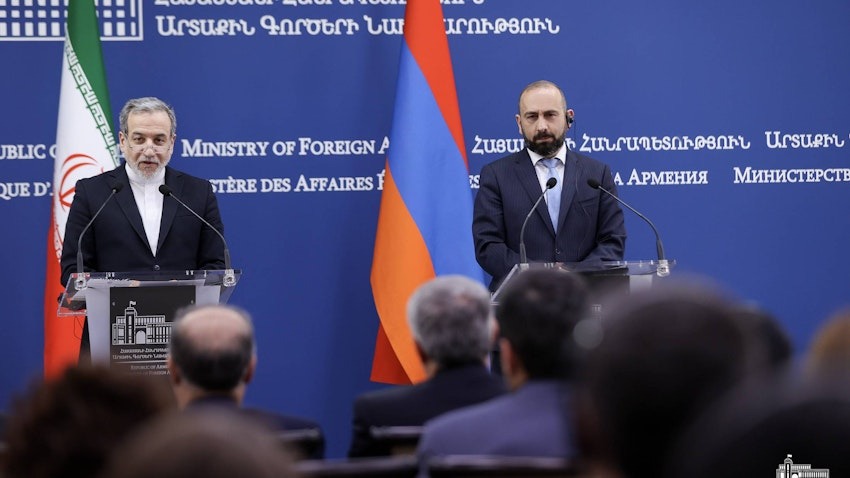
Amwaj.media: Pashinyan’s perceived weakness and willingness to make concessions to Turkey and Azerbaijan have raised concerns in Tehran
Over the past month, Armenia and Iran have stepped up interactions in the diplomatic and security spheres. In March, Iran’s Foreign Minister Abbas Araghchi paid a visit to Yerevan as part of a broader effort by Tehran to engage its neighbors. At a joint press conference with his Armenian counterpart Ararat Mirzoyan, Araghchi reiterated Iran’s firm opposition to territorial and geopolitical changes in the South Caucasus and its rejection of the threat or use of force to promote such changes, Amwaj.media writes.
Despite efforts to forge a peace deal between Baku and Yerevan, that prospect has remained elusive. Azerbaijan is not in a rush to sign an accord.
The website notes that Baku has established control of the Nagorno-Karabakh region, which was followed by the displacement of 120,000 ethnic Armenians. However, Azerbaijan continues to seek further concessions from Armenia, such as constitutional changes.
Even more worrisome, from Tehran’s perspective, is Baku’s insistence on developing the “Zangazur Corridor”. The envisioned transit route seeks to connect Azerbaijan’s mainland with the Nakhijevan exclave. This matter is not addressed in the draft peace deal.
The article says that Azerbaijani President Ilham Aliyev has repeatedly referred to southern Armenia as Azerbaijani land to be “returned” to Baku’s control, raising fears in Iran about losing its border with Armenia.
Tehran worries such a scenario would in turn also cut off its access to the Black Sea and Europe via Georgia, make it overly dependent on Azerbaijani and Turkish good will, and extend Israel’s influence on its borders. This context explains Araghchi’s strong warning against any changes to borders in the South Caucasus.
“While Armenia could in usual circumstances be expected to also prioritize its territorial integrity, its current approach presents a more complex picture that may strain relations with Iran. Following the wars with Azerbaijan in recent years, Armenia’s Prime Minister Nikol Pashinyan has sought to shift away from Russia towards the west, aiming for reconciliation with Turkey as well as closer ties with the EU and the US. The logical culmination of that pivot is the Armenian parliament’s adoption of a law on EU integration,” the website writes.
As noted, these efforts are mutually reinforcing and supported by the EU, which views the South Caucasus primarily as a region to reduce Russian influence. Opening the border with Turkey would integrate Armenia into the “Middle Corridor” project, a trade route favored by Brussels to bypass Russia and Iran. Armenian leaders may see economic benefits in this project for their landlocked country. Armenia’s EU integration also allows Brussels to maintain a presence in the South Caucasus after the suspension of Georgia’s EU candidate status.
The website notes that Pashinyan has actively sought to engage with Ankara, hoping Turkey would influence its Azerbaijani ally to adopt a more flexible stance on a peace deal with Armenia. However, this approach has alienated many Armenians, both domestically and in the diaspora. Despite these efforts, Turkey has not distanced itself from Azerbaijan, which is more important for Ankara’s regional influence than Armenia.
Pashinyan’s perceived weakness and willingness to make concessions to Turkey and Azerbaijan have raised concerns in Tehran that he might concede to the “Zangazur Corridor” without military action from Azerbaijan. Pashinyan has signaled a readiness to facilitate Azerbaijan’s land communication to Nakhijevan. The key issue is whether the envisioned route would remain under Armenian sovereignty, as desired by Tehran and Yerevan, or become an extra-territorial corridor that is exempt from Armenian sovereignty—the path favored by Ankara and Baku,” the article states.
If Pashinyan yields to the former option, Iran may find itself in the position of having to defend the territorial status quo, including its border with Armenia, against the wishes of Armenia, Azerbaijan and Turkey. Araghchi’s visit to Yerevan can be seen as an effort to strengthen Armenia’s resolve and warn against concessions that would harm Iran’s interests.
By contrast, Tehran has been relatively relaxed about Armenia’s pro-EU drive. This is despite Iran’s strained relations with the European bloc over the future of its nuclear program, the war in Ukraine and other issues. However, Iran is skeptical about Armenia’s EU prospects. It believes that disillusionment will eventually lead Yerevan to prioritize its traditional relations, such as those with Tehran. Given the EU’s recent challenges in Eastern Europe, this skepticism may be justified.
As noted, geopolitical shifts in Eurasia could further alter regional dynamics in the South Caucasus. Russia might seek to reassert its influence, which has been weakened since the war in Ukraine began, to the benefit of Turkey and Azerbaijan.
Moscow might aim to curb Ankara’s influence, especially after Turkey gained an advantage in their regional competition following the toppling of Russia’s ally in Syria.
Armenia might in this scenario seek to repair ties with Russia to balance against the Turkish-Azerbaijani partnership, particularly if France and the EU cannot provide security guarantees. Iran would welcome this, as it sees Turkish-Azerbaijani dominance in the South Caucasus as detrimental to its interests.
Throughout these regional shifts, the fundamental reality remains that Iran is one of Armenia’s only two neighbors with diplomatic relations and open borders, the other being Georgia. For Iran, Armenia is its only friendly neighbor on its northwestern border. Tehran and Yerevan will therefore likely continue to negotiate and adjust their relationship as the broader geopolitical landscape evolves.


